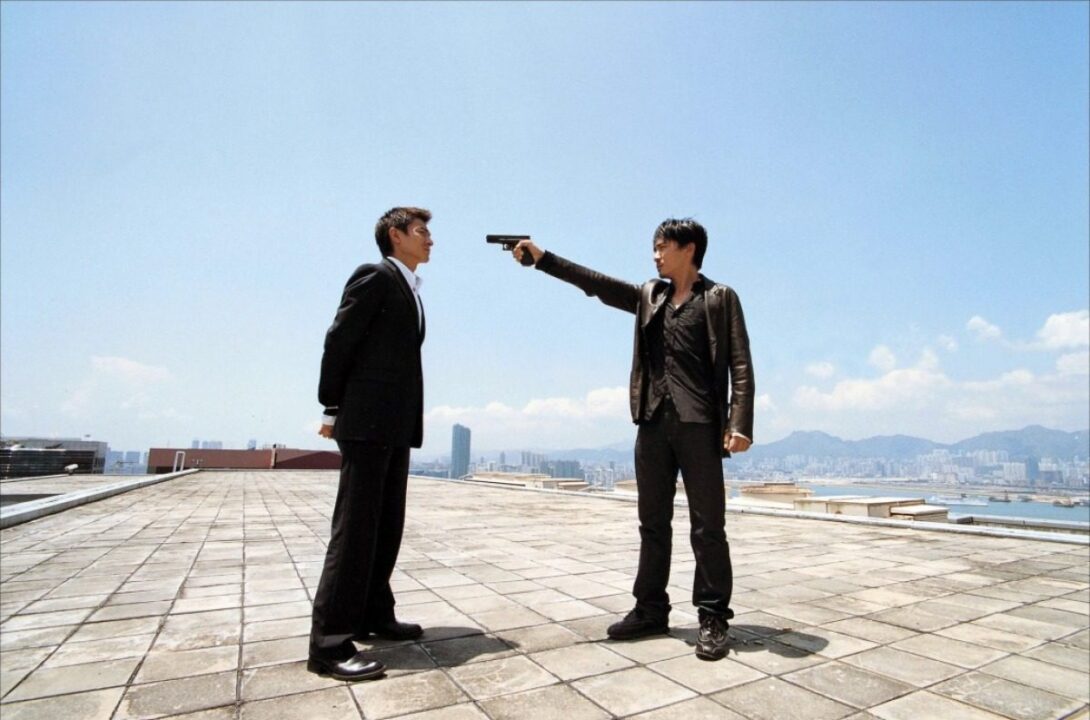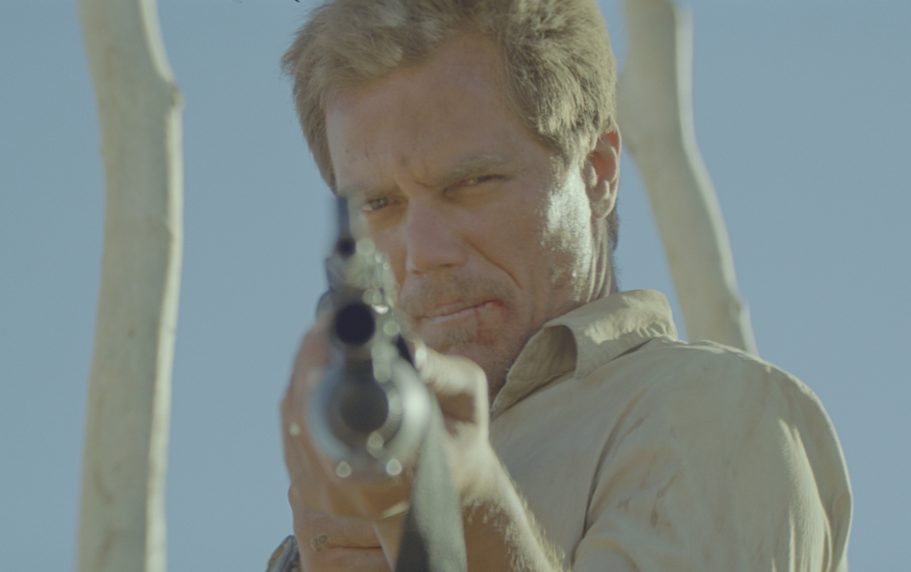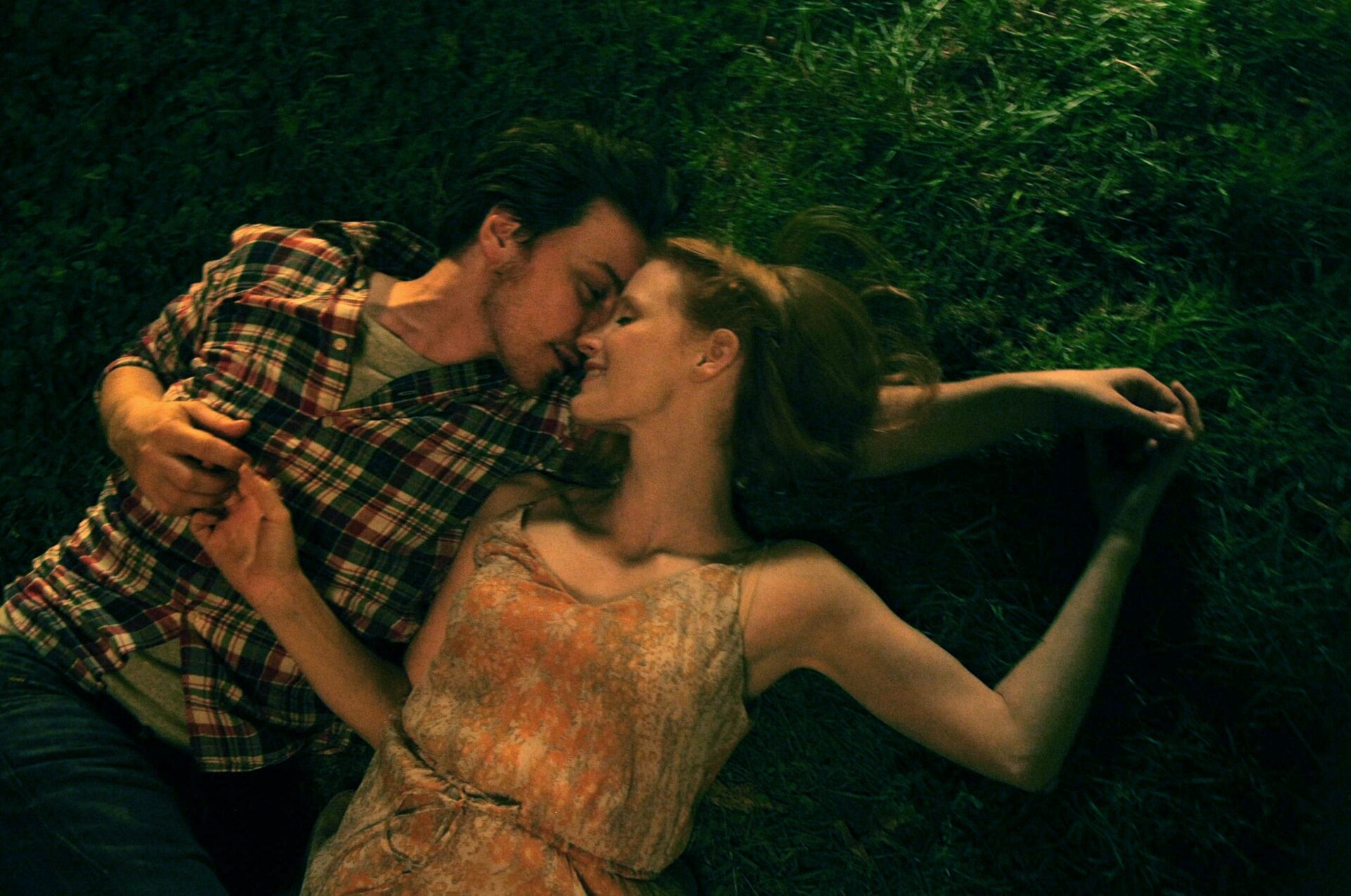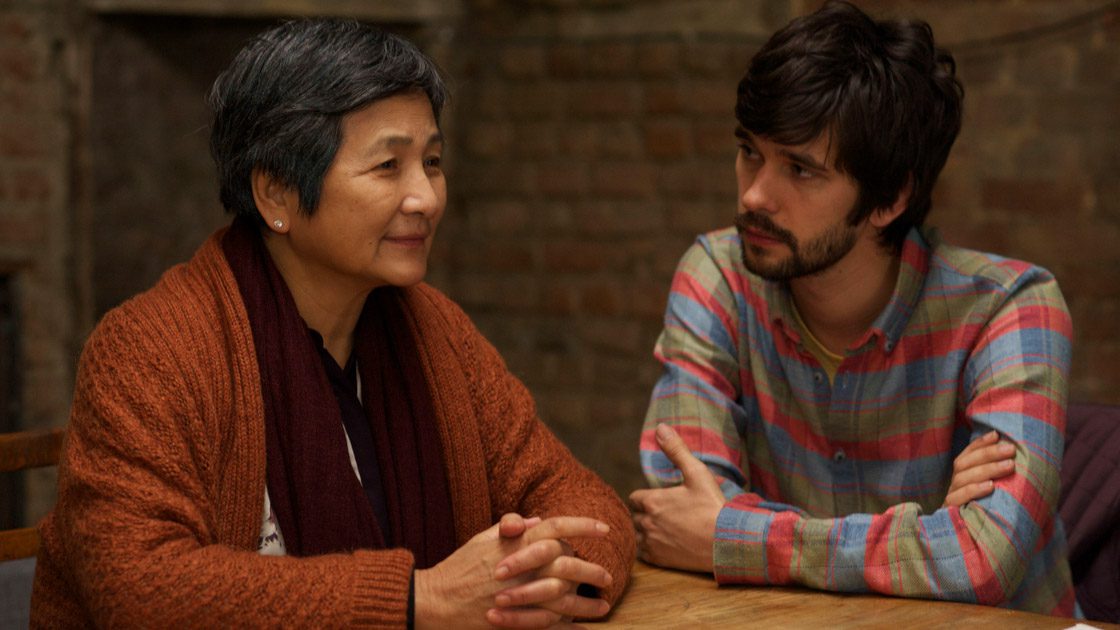Review: 'Revenge of the Green Dragons'
In 2006, Martin Scorsese finally collected a long overdue Best Director statue for helming The Departed, an American remake of Andrew Lau’s acclaimed Hong Kong crime thriller Infernal Affairs. Eight years later, Scorsese has returned the favor by adding some much-needed pedigree to Lau’s second English language film, Revenge of the Green Dragons. Unfortunately, Marty’s illustrious name does little to save such a miserable crime saga away from the bottom feeders.
Inspired by true events, Revenge of the Green Dragons follows the Reagan-era rise of two young Chinese-American immigrants: Sonny (The Twilight Saga’s Justin Chon) and Steven (YouTube® star Kevin Wu). As teens, the boys are shepherded into the infamous Green Dragons gang and soon win favor and superiority among its members by killing folks, stealing their cash, killing more folks and acting all other kinds of reckless around Queens’ Chinatown.
To the audience’s benefit, the film moves quick - but proves a disadvantage to a film that needs less characters and a little bit more development on its main players.
The boys journey through the Chinatown underworld is an all too familiar path through alleyways and seedy apartments stacked high with Benjamins, superfluous gunfire over said stacks, and a whole lotta shady loyalty. This is all accented by tedious expository voiceover intended to provide scope and significance. Curiously, it fails to affirm, or even clarify, any of the Green Dragon’s motivations. To the audience’s benefit, the film moves quick - but proves a disadvantage to a film that needs less characters and a little bit more development on its main players.
To call Kevin Wu’s Steven an interesting character would be overstating his performance. However, compared to every other player in the film, he is nearly fascinating. Sporting a curly topped mullet and green school-boy varsity jacket, he is the only character in the film who ponders his own recklessness with an ounce of authenticity. His pal Sonny is quite the opposite. Lacking any physical menace, Justin Chon struggles through the lead, leaving the post-production team to exploit manipulative slow-motion and a score of big-haired, 80's guitar wails to (de)accentuate nearly all of Sonny’s big moments.
The rest of the cast shouts expletives and terrorizes the neighborhood like middle school hooligans. Revenge of the Green Dragons is essentially an ugly montage of sloppy violence overcompensating for such poor performances, massacring any good story for gun shells. In fact, the film indulges in the Green Dragons criminal revelry with a very uncomfortable callousness, especially when it involves Sonny and Steven as children. At least Ray Liotta eventually sleepwalks into town to lock the Dragons up.
To its credit, Revenge of the Green Dragons almost ends on an innovative and rather timely note regarding America’s place for immigrants and the deceit of the American Dream. This, however, falls right before the film actually ends with a character revelation that falls so flat, it's embarrassing. By this point, however, Revenge of the Green Dragons has already fallen to the bottom of the action bargain barrel.
https://www.youtube.com/watch?v=M2eKchU1GZo
Review: 'Young Ones'
A bizarre post-apocalyptic amalgam of the current geographical and technological zeitgeist, spaghetti westerns and Star Wars, Young Ones is an intriguing, if not ingenious motion picture. Directed by Jake Paltrow - yes, the brother of Gwyneth - it is an unassured science fiction film with loving affection for its inherent influences and invention, set en-route toward fans of science fiction, westerns and even video-store cult films.
It follows the lineage of three men surviving in the dust bowl of the near American future. Each of their stories is told in a respective chapter beginning with Ernest Holm (Michael Shannon), a farmer who tends to what is left of his dirt fields. He holds steadfast to the idea that his land is still fertile despite the lack of any water. Motorbike bad boy Flem (Nicholas Hoult) wants Ernest’s land but also has the eye of Mary (Elle Fanning), Ernest’s daughter who reluctantly tends to their house after their mother is put in a care facility. In the middle of it all is young Jerome (Kodi Smit-McPhee), Ernest’s adolescent son who learns to survive on his wits in the barren landscape.
It is clunky, but it brims with imagination and succeeds with proficiency in most of the many - maybe too many - concepts writer/director Jake Paltrow attempts to plant in the film’s bleak landscape.
From the get-go, Young Ones is crowded with postcard scenery. Cinematographer Giles Nuttgens captures the desolate sandscapes with a muted beauty. Though the terrain is unidentified, the South African filming locations evoke memories of Tatooine and the outback of Mad Max. These visions are enhanced further by the film format and hokey transitions that harken back to the original Star Wars trilogy as well. This timeless aesthetic Paltrow and Nuttgens have come close to perfecting is one of the films most effective charms. Paltow’s interest in robotics and technology of the near future may be the film’s most fascinating element. The most evocative image from the film is the robotic donkey that Ernest invests in as it crawls through the rocks and hills. Much like Neil Blomkamp’s two features, Paltrow harnesses the inevitable truth that complex technology will soon be available to all walks of life - a concept that Young Ones exposes very well. The concepts of water politics and resource transfer are uncanny in their relevance to the current drought across the American southwest. While it lacks insight into solutions - that isn’t what Paltrow strives for - the narrative surrounding water trade is again all too close to the near-future. Complex thematic interests may be too broad for such a small film, but they create a fascinating world. It may be just a growing pain, but he seems much more fascinated at the aesthetics of the world he has written, than exploring their implications.
The hopeless, cutthroat atmosphere is one of Young Ones’ strongest elements. It's rather slow-paced in moments, but as a quasi-western, it unfolds with a careful, slow-burning unease of - dare I say it - John Ford and Sergio Leone. Unfortunately, Paltrow lacks the prowess to really trust in his actors and settings to sharpen the film’s fangs. Michael Shannon does rather well, but dull expository dialogue sets the film back into stale melodrama. Fanning and Hoult are the biggest victims of this - especially Fanning whose character may be the weakest of her young career. While Hoult’s charisma allows him to work a little with the material, Fanning overcompensates to an irritating level. Young Kodi Smit-McPhee is the film’s secret weapon. Anchoring a shaky second act, Smit-McPhee completely commandeers a compelling third act to its explosive conclusion, much like he proved in 2010’s Let Me In, the little-seen, but excellent remake of Let the Right One In. He is an actor who is beyond his years in his understanding of restraint and subtext.
As peculiar as it is, Young Ones is a timeless and - maybe unintentionally so - timely slice of science fiction. It is clunky, but it brims with imagination and succeeds with proficiency in most of the many - maybe too many - concepts writer/director Jake Paltrow attempts to plant in the film’s bleak landscape. Down to its credits, his sophomore feature is a unique beast, an admirable - maybe quite successful - experiment that seems destined for reexamination in the near or distant future. Its potential for cult success is undeniable because Young Ones has a lot to love. It may feel a little mismanaged at times, but hats off to Mr. Paltrow for one of the most inventive features in Hollywood that is all too often bleeding out of innovation.
https://www.youtube.com/watch?v=JiSU-Mv8eTc
Review: 'The Disappearance of Eleanor Rigby: Her/Him'
It's a standard story on paper. New York thirty-somethings' Connor and Eleanor are a couple struggling to keep their marriage afloat after the passing of their infant son. Connor (James McAvoy) is the struggling restaurateur son of a wildly successful restaurateur (Ciarán Hinds). Eleanor (Jessica Chastain) is the ‘faculty brat’ daughter of her NYU professor father (William Hurt) and French-born mother (Isabelle Huppert). Unhappy in her marriage, she walks away from Connor and returns to her family’s home after jumping from a city bridge. Melodrama and heart-tugging should ensue. But first-time director Ned Benson's The Disappearance of Eleanor Rigby: Her/Him is bolder, more audacious than that.
Much like (500) Days of Summer or Blue Valentine, The Disappearance of Eleanor Rigby:Her/Him finds a debut feature reexamining the cinematic relationship. Rather than one film following Connor and Eleanor’s choppy love, Benson splits its narrative into two separate films, :Him and :Her, which each tell the story from each perspective of the relationship. A combined :Them version debuted earlier in September. However, after seeing Her and Him as two separate, subjective stories, any attempt to combine the halves would render useless and unnecessary (Read Ryan's review of The Disappearance of Eleanor Rigby: Them, here). Connor and Eleanor’s relationship together is standard indie romantic fare. But, by delivering each character dealing with the grief and confusion of a failing relationship away from each other, Benson gives us what we rarely see in film: a full picture of life that doesn't compromise or steer the film's audience into one narrative.
A combined :Them version debuted earlier in September. However, after seeing Her and Him as two separate, subjective stories, any attempt to combine the halves would render useless and unnecessary.
That being said, it’s actually rather difficult to look at Her and Him as two separate films critically, because without one the other would be nullified. They are, however, indeed rather distinct. Eleanor’s half is dark, morose and filled with grad-school angst. Connor’s is cooler, lighter and awkwardly balances Eleanor’s dramatic bend with a splash of late 90's indie dramedy. As the title may hint, Benson gives Eleanor’s story more time of day. What Benson’s gimmick also provides for is much greater subtext and far less exposition than one is used to in current Hollywood filmmaking. While his script does meander into vague philosophical quips and one-liners on many occasions, his words are still strong and beautiful.
Jessica Chastain reaps the benefit of this the most. She is magnetic and the supporting cast in her narrative is fascinating. Barely given much screen time, her parents’ relationship is nearly as poignant of a portrait of the hardships of marriage as the entire double feature. McAvoy’s supporting cast lacks much depth. Bill Hader seems rather miscast as Connor’s chef pal and his whole staff adds an awkward humor to the Him half after the almost humorless first 100 minutes of the Her half. McAvoy plays Connor well though with brooding optimism that is undeniably charming but comparably unfocused next to Chastain's hard-edged Eleanor.
I had a professor who once declared that if somebody isn’t together at the end of a film then it something isn’t working. To an extent, this is very true. Whether it be the lowball charm of the romantic comedy, the opulent nostalgia of the period romance or the Olive Garden commercial affection of the annual Nicholas Sparks drama, there is a natural human instinct to hope for the couple at the core of the film. That is precisely why The Disappearance of Eleanor Rigby is a revelation of a debut feature. At the end of the nearly 200-minute drama, you’re not actually rooting for Connor and Eleanor. You are rooting for Connor. And you are rooting for Eleanor. It’s the rare film that is wise enough to realize that love may make the audience happy, but it may not make the characters happy. That is the beauty of The Disappearance of Eleanor Rigby: Her/Him. It gives its characters freedom, and more importantly, voice.
https://www.youtube.com/watch?v=-Ng4MD66WyU
Review: 'Lilting'
"Lilting" is a term used to describe the rising and falling of the voice, mostly in regards to the Irish accent. Merriam-Webster describes it as “attractive," “pleasing,” and “buoyant.” Lilting, the debut feature from Cambodian writer-director Hong Khaoh, similarly explores the patterns of language and communication. It is, however, a quiet meditation on the rather heavy burdens of love, loss and isolation.
The film explores the relationship between an elderly Chinese-Cambodian immigrant, Junn (Pei-Pei Cheng) and her late son’s former lover, Richard (Ben Whishaw, Skyfall). As the two both struggle to overcome the grief of their loss, Richard hires a young interpreter, Vann (Naomi Christie) to ease his own communication with Junn and help her find a connection in an elderly resident of her retirement home, Alan (Peter Bowles).
There is a quiet vulnerability to Whishaw’s lead as he struggles with becoming overbearing in his attempted care for Junn. Cheng's stubbornness as Whishaw's culturally-opposite comes close to flat on occasion, but in her most tender moments, she shines. This central relationship is dynamic and affecting, but the actors’ best moments are in their singularly alone moments onscreen. Cheng's most heartbreaking moment comes in the final seconds of the film's first sequence, a masterful flashback that grasps the most painful moments of loss in a simple cut. Whishaw shines in a similar moment toward the end of the film, and there are many likewise artful sequences that see Khoah skillfully blurring reality and memory.
Much like Pontikos’ soft cinematography, the film is a tender, cozy piece- a fireside conversation about language, loss and love.
However, when the film is fully grounded in the reality, it is far less poetic. The film never drags at a swift 86 minutes, but it begins to feel repetitive and stuck in its own circle. While gorgeous in its muted tones, Urzsula Ponitkos’ cinematography is limited to the most basic of conversational coverage. In more steady, heated conversations, this is just enough- but this lack of variation often accentuates the merely passable dialogue. This culminates in an underplayed climax that, though touching in its final moments, lacks the dramatic power to really reach audiences on another level. The film also has difficulty including the supporting players, Alan and Vann. Junn’s relationship with Alan is amusing but unfocused. As the interpreter, Vann is given an interesting humanity, but her relationship with Richard feels weak and contrived.
Lilting is not a film that attempts to be elaborate or melodramatic. Much like Pontikos’ soft cinematography, the film is a tender, cozy piece- a fireside conversation about language, loss and love. What Hong Khaoh has directed is less of a film than it is a microphone. Lilting is a film that you listen to, a piece that explores not only the barriers of language but the barriers of emotion that can keep us alone. Rather than a dynamic narrative lilt, the film unfortunately only walks a steadily level path.
https://www.youtube.com/watch?v=I8HhLd07fYY




